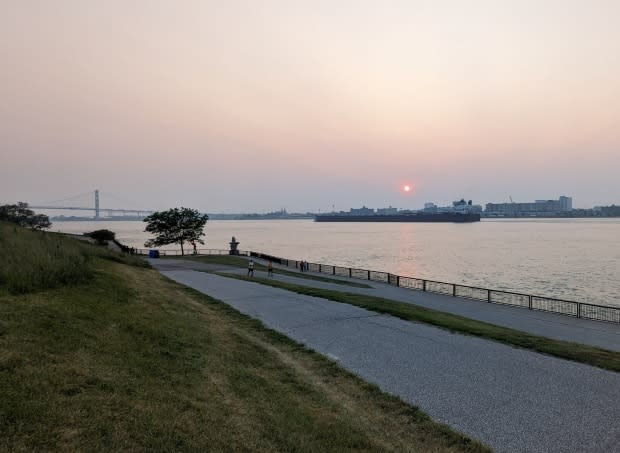Windsor's air quality has been 'unhealthy' this week, data monitoring system shows

A technology company that monitors air quality data and airborne pollutants shows Windsor's air quality has been "unhealthy" for the past three days — and at times, some of the worst in the world.
Since Monday, IQAir says the city's air quality index (AQI) level has peaked at around 155. For comparison, the tracker puts Delhi, India, at 191 AQI as of 12 p.m. ET Wednesday.
Windsor has since dropped to levels deemed "moderate" and "unhealthy for sensitive groups of the population."
The IQAir monitoring website partners with Greenpeace and United Nations groups. It also pulls data from Ontario government monitoring stations.
Ontario's Air Quality Health Index (AQHI) puts Windsor into a high risk designation with a rating of seven. That level is set to increase to eight on the weekend.
Environment Canada's air quality advisory for Windsor was in effect on Wednesday.
The weather agency released a "special air quality statement" saying poor air quality is expected to persist into the weekend because of forest fire smoke plumes from Quebec and northeastern Ontario.
"Air quality and visibility due to wildfire smoke can fluctuate over short distances and can vary considerably from hour to hour," the statement said.
An air quality alert was also issued by Environment Canada for Chatham-Kent and Sarnia-Lambton.
The agency says wildfire smoke can be harmful to everyone's health even at low concentrations.
"Continue to take actions to protect your health and reduce exposure to smoke. People with lung disease (such as asthma) or heart disease, older adults, children, pregnant people, and people who work outdoors are at higher risk of experiencing health effects caused by wildfire smoke."

It also suggests staying inside if you are feeling unwell and stopping outdoor activities, and to contact your health-care provider if you or someone in your care experiences shortness of breath, wheezing (including asthma attacks), severe cough, dizziness or chest pains.
"If you must spend time outdoors, a well-fitted respirator type mask that does not allow air to pass through small openings between the mask and face, can help reduce your exposure to the fine particles in smoke."

